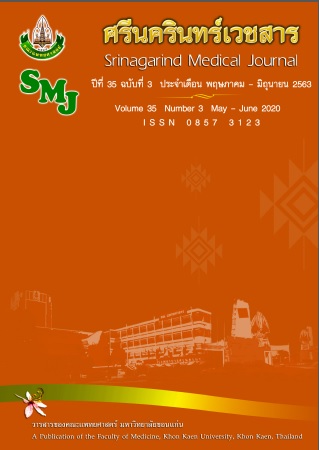Development of the Warfarin Knowledge Test in Patients Receiving Warfarin at Pathumthani Hospital
Keywords:
Warfarin; Test; Knowledge; Validity; ReliabilityAbstract
Background and Objective: Assessing patient’s knowledge on warfarin therapy is one of the key strategies for anticoagulation management. It helps pharmacist to identify patient’s knowledge deficits that can lead to improve the efficacy and safety of anticoagulation therapy. The objectives of this study aimed to develop a warfarin knowledge test for patient to complete the questionnaires at the clinic and to validate the quality of test in aspects of content validity, item difficulty, item discrimination, reliability and construct validity.
Method: Research and development study including 2 steps: First step was to construct and develop a warfarin knowledge test using 6 experts. Step 2 was to validate the quality of a test. Warfarin knowledge test was administered to two groups of participants comprising of 67 patients who were taking warfarin at Pathumthani hospital and 100 general public. Item difficulty and item discrimination, reliability and construct validity were analyzed by using Brennan Index, Lovette, and Carver methods, respectively.
Result: Thirty multiple-choice questionnaires of warfarin knowledge test for patients to complete at the clinic had item content validity index between 0.83-1.00, the difficulty index between 0.20-0.90, the discrimination index between 0.20-0.80 with the reliability of 0.76 and the construct validity of 0.76.
Conclusion: The results shows that the developed warfarin knowledge test has acceptable level of quality for self-assessing the patient’s knowledge in routine clinical practice
References
2. Leekcharoen S, Anantachoti P. An evaluation of pharmacist counseling to patients receiving warfarin at Samutprakarn hospital. Thai Pharm Health Sci J 2011;6:91-9.
3. Nissaidee C, Suelueam N. Impact of pharmacist counseling on medication knowledge in out-patient receiving warfarin : case study in Nakhonprathom hospital. Thai Pharm Health Sci J 2008;3:80-6.
4. Chenot JF, Hua TD, Abu Abed M, Schneider-Rudt H, Friede T, Schneider S, et al. Safety relevant knowledge of orally anticoagulated patients without self-monitoring: a baseline survey in primary care. BMC Fam Pract 2014;15: 104.
5. Wofford JL, Wells MD, Singh S. Best strategies for patient education about anticoagulation with warfarin: a systematic review. BMC Health Serv Res 2008; 8: 40.
6. Briggs AL, Jackson TR, Bruce S, Shapiro NL. The development and performance validation of a tool to assess patient anticoagulation knowledge. Res Social Adm Pharm 2005; 1: 40-59.
7. Zeolla MM, Brodeur MR, Dominelli A, Haines ST, Allie ND. Development and validation of an instrument to determine patient knowledge: the oral anticoagulation knowledge test. Ann Pharmacother 2006; 40: 633-8.
8. Obamiro KO, Chalmers L, Bereznicki LRE. Development and validation of an Oral Anticoagulation Knowledge Tool (AKT). PLoS ONE 2016;11: e0158071.
9. Sattanon S. The evaluation of out-patients warfarin knowledge and correlated factors in warfarin clinic, Phetchabun hospital. Uttaradit Hospital Medical Journal 2014; 29: 8-18.
10. Silpipat C, Sastravaha K. Correlation between knowledge and adherence of patients to warfarin therapy and their baseline characteristics in heart valve replacement at Bhumibol hospital. Thai Heart Journal 2012; 25: 45-51.
11. Loharattanakong P, Ritthiboon P, Hongrinya Y, Chaichun M, Taksinachanekij S, Uchaipichat V. Warfarin using knowledge and international normalized ratio goal control in outpatients of Queen Sirikit Heart Center of the Northeast. Srinagarind Med J 2016; 31: 257-65.
12. Yeephu S, Jittue A, Potaros T, Sekkhunthod J, Timkorn P. Study of knowledge and drug related problems of warfarin at outpatient Vachiraphuket hospital. Songkla Med J 2015; 33: 83-92.
13. Sittidach M, Muhammad P, Malanusorn N, Kiettanawattana P. Effect of pharmaceutical care on patients with mechanical prosthetic valve who received warfarin at Songklanagarind hospital. Songkla Med J 2012;30:63-73.
14. Polit DF, Beck CT. The content validity index: are you sure you know what's being reported? critique and recommendations. Res Nurs Health 2006; 29: 489-97.
15. Pattiyatanee S. Educational measurement. Kalasin: Prasan Printing, 2015.
16. Kanjanawasee S. Classical test theory. Bangkok: Chulalongkorn University Printing House, 2007.
17. Srisatidnarakul B. Development and validation of research instruments: psychometric properties. Bangkok: Chulalongkorn University Printing House, 2012.
18. Kitpridaborisut B. Technique of creating research instrument for data collecting. Bangkok: Srianan Printing, 2010.
19. Secondary education service area office 38. The analysis of norm referenced-criterion referenced test analysis [Internet]. 2017 [cited Apr 22, 2017]. Available from: https://www.spm38.go.th/home/index.php/dispatch/news/526-13.html.
20. Iramaneera C. Item analysis. Si Med Bull 2009; 2: 31-7.




